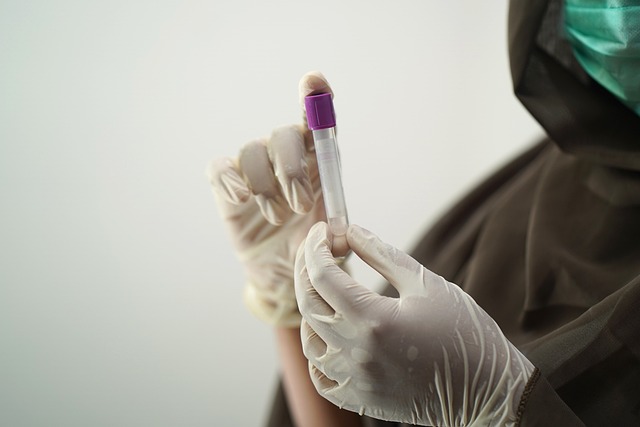Thyroid health is often overlooked in the UK but is crucial for overall well-being. Standardized testing, including TSH levels and iron blood tests (UK Iron Blood Test), is key to early detection of thyroid disruptions, which can cause fatigue, weight issues, mood changes, and cardiovascular problems. Primary care providers conduct initial screenings using high-quality UK Iron Blood Test kits, ensuring consistent care and efficient specialist referrals. These kits should include clear instructions, precise measuring devices, a sealed storage container, and an educational leaflet on iron deficiency anemia symptoms and test interpretation, empowering patients to actively manage their health.
In the UK, maintaining thyroid health is paramount for overall well-being. Understanding thyroid function through a standardized UK Iron Blood Test kit is essential for early detection and management of thyroid-related disorders. This comprehensive guide delves into the significance of such kits, outlining their crucial components and providing step-by-step instructions on usage and result interpretation. Equip yourself with knowledge to navigate your thyroid health effectively.
- Understanding Thyroid Health: Why UK Patients Need a Standardized Kit
- Components of an Ideal UK Iron Blood Test Kit
- How to Use and Interpret Results from Your Thyroid Examination Kit
Understanding Thyroid Health: Why UK Patients Need a Standardized Kit
Thyroid health is an often-overlooked yet critical aspect of overall well-being, especially for UK patients. The thyroid gland, located at the base of the neck, plays a pivotal role in regulating metabolism and influencing various bodily functions. Disruptions in thyroid function can lead to a range of symptoms, including fatigue, weight fluctuations, mood changes, and cardiovascular issues. Early detection through standardized testing is crucial for effective management and treatment.
In the UK, patients often rely on primary care providers for initial screening. A standard thyroid examination kit should include essential tests like TSH (Thyroid-Stimulating Hormone) levels, which indicate thyroid function. Additionally, checking for iron blood test results is vital as anemia, a common condition associated with thyroid disorders, can significantly impact overall health and quality of life. Standardization ensures consistent care across healthcare settings, allowing for better patient outcomes and an efficient referral process to specialists when necessary.
Components of an Ideal UK Iron Blood Test Kit
An ideal UK Iron Blood Test kit should include a comprehensive range of components to ensure accurate and reliable results. Key elements include high-quality test strips or cards that specifically detect iron levels in the blood, along with clear, easy-to-follow instructions for proper sample collection and analysis. The kit must be equipped with precise measuring devices, such as microliter pipettes, to handle small volumes of blood samples accurately. Additionally, it should provide a sealed storage container for safe transport of the sample to the laboratory, minimizing the risk of contamination or degradation.
Furthermore, the UK Iron Blood Test kit should come with a detailed patient information leaflet that educates users on iron deficiency anemia symptoms, the importance of regular testing, and what the results mean. This empowers patients to actively participate in their healthcare by understanding their test outcomes and taking appropriate measures if needed. An efficient and user-friendly kit design, along with comprehensive educational materials, significantly enhances the overall diagnostic experience for UK patients.
How to Use and Interpret Results from Your Thyroid Examination Kit
Using your thyroid examination kit is straightforward. Follow the instructions carefully for accurate results. Typically, this involves taking a small sample of blood via a finger prick or vein draw, then adding it to the test strip or well within the kit. Wait for the specified time, usually a few minutes, and observe the colour change on the strip, which indicates your thyroid hormone levels.
Interpreting the results requires understanding what ‘normal’ ranges are in the UK context, often defined by laboratory references. TSH (Thyroid Stimulating Hormone) levels below 0.4 mIU/L are generally considered normal. For T3 and T4 hormones, free T3 and free T4 levels respectively, values within 0.8 to 2.0 ng/dL (or nmol/L) are typically considered optimal for adults. Any deviations from these ranges may indicate hypothyroidism or hyperthyroidism, prompting further medical investigation including consultation with your healthcare provider. Remember, only a qualified professional can interpret results accurately and offer appropriate guidance based on your individual health profile.
In light of the importance of thyroid health for UK patients, a standardized thyroid examination kit is an invaluable tool. By incorporating essential components like a UK Iron Blood Test kit, healthcare professionals can ensure accurate diagnosis and effective management of thyroid conditions. Understanding how to use and interpret these kits empowers individuals to actively manage their thyroid health, leading to better overall well-being.
